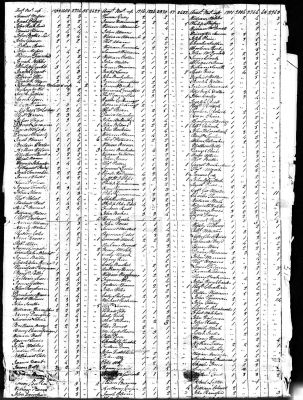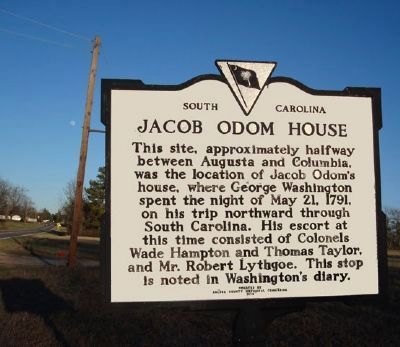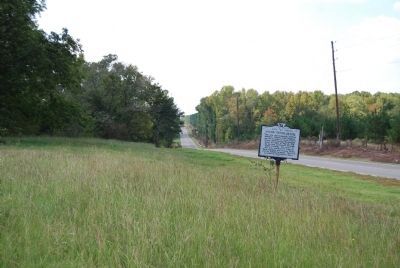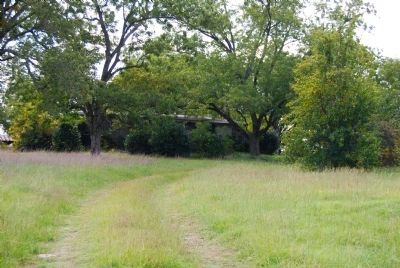Near Monetta in Saluda County, South Carolina — The American South (South Atlantic)
Jacob Odom House
This site, approximately halfway between Augusta and Columbia, was the location of Jacob Odom's house, where George Washington spent the night of May 21, 1791, on his trip northward through South Carolina. His escort at this time consisted of Colonels Wade Hampton and Thomas Taylor, and Mr. Robert Lythgoe. This stop is noted in Washington's diary.
Erected 1970 by Saluda County Historical Commission. (Marker Number 41-3.)
Topics and series. This historical marker is listed in this topic list: Patriots & Patriotism. In addition, it is included in the Former U.S. Presidents: #01 George Washington, the George Washington Slept Here, and the South Carolina, Saluda County Historical Commission series lists. A significant historical date for this entry is May 21, 1845.
Location. 33° 51.07′ N, 81° 37.086′ W. Marker is near Monetta, South Carolina, in Saluda County. Marker is on State Highway 23, 0.3 miles west of Main Street (State Highway 39), on the left when traveling west. Touch for map. Marker is at or near this postal address: 3356 Highway 23, Monetta SC 29105, United States of America. Touch for directions.
Other nearby markers. At least 10 other markers are within 7 miles of this marker, measured as the crow flies. Alexander Hamilton Stevens (approx. 1.6 miles away); Ridge Spring Cemetery / W.H. Scarborough (approx. 1.6 miles away); Ridge Hill School / Faith Cabin Library (approx. 2.4 miles away); Ridge Spring (approx. 2.6 miles away); Michael Watson (approx. 2.6 miles away); Jones Cemetery / General James Jones (approx. 3.4 miles away); Batesburg Institute (approx. 5.3 miles away); Blinding of Isaac Woodard (approx. 5˝ miles away); Site of the "Swamp Rabbit" Bridge / The Swamp Rabbit (approx. 6.3 miles away); Spann Methodist Church / Captain Clinton Ward (approx. 6.3 miles away).
Regarding Jacob Odom House. The original house was a two story Carolina I-shaped log cabin made of Pine and Oak, with four or five rooms. It is no longer standing; it burned, fell, or was torn down by 1920. Some of the older citizens in the late 1980's remembered and described it. Also parts of the original house were found when building the current home on the site in the 1950's. It is situated on the Indian branch of Cloud's Creek. There is a slave cemetery on the site as well as the Perry Family Cemetery across the road from the marker. Martha's Unmarked Grave is most likely in this area, although a memorial to her is in the Watson Plot of the Ridge Spring Cemetery.
Also see . . .
1. Abraham Odum / Odom and Samuel Marsh. More details of the of the family tree. (Submitted on April 13, 2008, by Susan Taylor Aldridge of Aiken, South Carolina.)
2. Wade Hampton I. Wade Hampton (1752 – February 4, 1835) was a South Carolina soldier, politician, two-term U.S. Congressman, and wealthy plantation owner. (Submitted on March 13, 2009, by Brian Scott of Anderson, South Carolina.)
Additional commentary.
1. The House and Martha Watson
The house was a 2 story log cabin of a revolutionary war widow, Martha Watson b: Nov 1753 Death: Sep 1817 in Ridge Spring, Edgefield Co, SC and her new husband Jacob Odum (Charity, Martha are children). Washington was paying his respects and thanking her for her late husband Captain Michael Watson's service and death of wounds received at Deans Swamp (near present day Salley, SC) 5 May 1782. The escorts stayed in nearby homes, as there was not room for all the entourage to stay here. This land was situated in the District of Ninety Six on Dry Creek waters of Mine Creek bounding northward on James Cox, southward.
Martha Watson's children were Elijah b: 18 May 1775 in Johnston County, NC, Mary b: 12 Aug 1769 m. Ezekiel Perry, Kesiah m. Robert Carter Willis Sr, Patience
m. Anderson, Sarah m. James Perry.
When the family buried her, they failed to mark her grave as Odom because the family opposed the marriage, perhaps because she had inherited 1700 acres through Michael. Her gravestone reads, "In memory of Martha, a loyal patriot widow of Capt. Michael Watson of Revolutionary Fame."
Court record:
Name of complainer. Odum, Martha et al
Name of complained against. Watson, Arthur et al (her brother)
Box number 68, pack number 3468, year 1804.
Abstract of contents.
Martha widow and admin of James Odum of Edgefield, dec. Formerly the widow of Michael Watson of Edgefield. Orators inc: James only son, Elijah Watson with Ezekiel Perry and Mary Perry. William Anderson and Patience, James Perry and Sally, Robert Willis and Kesiah. 4 dtrs - named in Mike’s will (dt. May 6, 1782), 300 acres to widow. CLoud’s Creek goes to Ezekien bnd by Warner?, Cusack Allen. 550 acres. Arthur Watson, Robert Stark (written Clark?) execs. Problems. 8 tracts of land in Edgefield and Orangeburgh. 1700 acres. Jacob Reed, Ephriam Ramsy. Inventory. Thomas Cunningham 1795. Sales Names inc Henry Pendleton, Richard Johnson, John Whitsell, Nicholas Eveliegh, John Body, many others. WILL: Michael Watson. Wit: Robert Stark, William Withers, Richman Watson. accts: Many names.
I don't know who James Odom is - it may be that his name was wrongly
written and should have been Jacob. or maybe James was Jacob's son. And I dont know why her Watson children would be in a suit concerning an administration of Odom. Or why she would be going against her brother Arthur Watson, also her neighbor. Jacob Odom and Martha had a child named Nancy who married a Craven (according to Edgefield Co Court records).
— Submitted April 12, 2008, by Susan Taylor Aldridge of Aiken, South Carolina.
2. Captain Michael Watson
Michael Watson was born in 1726. He died in 1782 in Dean's Swamp, Orangeburg Co., South Carolina and is buried at the Episcopal Church in Orangeburg.
The following except is from pages 146-149 of History of Edgefield County From the Earliest Settlements to 1897, by John Abney Chapman and originally published in 1897 by E.H. Aull.
Michael Watson's first assay in arms with the militia of South Carolina was in 1762, in the expedition against the Cherokee Indians led by Colonel Grant of the regular army. And after that he was found very forward, brave, and efficient in opposition to the lawless banditti in 1767 and 1768. I find no mention of the time when Michael Watson's father settled in Edgefield District, but he must have been amongst the first I that section of the country. At that time there were

United States Census, 1790
5. Edgefield Co neighborhood of Martha Watson and Jacob Odom at the visit of George Washington
1790 census, first column, with Jacob Odom at the time of Washington's visit in the first column. Martha has a full house in 1790 as well as 6 slaves. Her new husband Jacob Odom has moved in. She has her newly married daughter Mary and husband Ezekiel Perry. She has her 4 other Watson children, as well as her new baby Nancy Odum. Also in the first column is Mary Odum, 7 names above Jacob. In the second column in the middle is a William Odum (could be Jacob's brother Willis) and at the bottom is another Jacub Odom. This could be Jacob's nephew.
The peace of 1763 turned loose a great many soldiers on both sides of the Atlantic, who had been rendered unfit for the arts of peace, and who sought to live by preying upon the property of others. Many of these sought refuge in the District of Ninety-Six as a secure asylum, and as a good field for their operations, as there were no courts nearer than Charleston, which was a hundred and fifty or two hundred miles away… But before these courts were established we find that in 1767 a a band of marauders made an inroad among the neighbors of Michael Watson on the Ridge, and threatened the life of his father. Michael, William, and their father, with two other men, pursued them about thirty miles. When they overtook them they found them lodged I a house in which they had taken shelter. The Watson party advanced and were fired upon by those inside. Old Mr. Watson, William, and one other were instantly killed. Michael was wounded, but he and the other survivor rushed into the house before those inside could reload their guns. Michael killed two of them; his friend, whose name is not known, wounded another, but the survivors made their escape. Some of them were afterwards captured and taken to Charleston and tried…
When the Revolutionary War began Watson was already well known for his courage and patriotism. In the war against the Cherokees, in 1776, he rendered very efficient service at Little River, when the division was in some confusion, by collecting a chosen band and charging the Indians, driving them back and so saving the division. After the fall of Charleston, and the British and Tories became dominant in the up country, on one occasion a party surrounded his house at night while he was in bed. He heard them talking at one end of the house about the mode of attack. He did not stay long upon the order of his going (?) but went at once, and seizing his gun he ran out of the door a the other end of the house, and escaped to the woods about fifty yards distant. He then began to cal out, as if to collect a body of men on guard: “Here they are! Come on, boys! Charge!” He then fired off his gun. The Tories were frightened and somewhat disgusted, and left speedily.
At another time his house was surrounded in the open day, when he was alone with his family. He leaped out through a window and ran for the woods. The enemy fired at him as long as he was in sight, but he escaped unhurt, though his clothes had several bullet holes through them. Afterwards a Tory Colonel, Kin Williams, came to his plantation with three hundred men… Watson was not at home at the time, or he would probably have been killed. They burned every house on the place; killed every hog and cow, and all the poultry, and either destroyed or carried away all the provisions. With the assistance of his neighbors, he made another home about eight miles away, but he was still frequently disturbed. On once occasion a man named Hartley undertook to carry off the only horse he had left. Watson was then at home and was too much for Hartley. He fired upon him, wounded him in the arm, and took him prisoner; made him go home with him, dressed his wound, and treated him with greatest kindness. Such kind treatment from Watson and his family had so good an effect upon Hartley that he left the Tories, became a good Whig and served under Watson. Often after the war he was heard to relate these facts.
Watson's career was brought to a close a short time before the close of the war. In May 1782, hearing of a body of Tories in Dean's Swamp, near Orangeburg, Watson and William Butler determined to attack them…
The following except is from pages 526-529 of The History of Orangeburg County South Carolina by Alexander Samuel Salley, John Ulrick Giessendanner, John Giessendanner, originally published in 1898 by R.L. Berry, printer
…The country from the Edisto to the Santee became thrown open in consequence for a time to the ravages of the enemy and a party of Tories under the command of William Cunningham "Bloody Bill" escaped from the lower country passed through Orangeburg District and ascended the Saluda with a body of three hundred horse By the beginning of the year 1782 the British held no posts outside of Charlestown but they did not formally retire from that city until December 14th 1782.
"Near the close of these troubles in South Carolina in May 1782 Captain Michael Watson heard of a body of tories in Dean's Swamp near Orangeburg and in conjunction with Captain William Butler - his friend and neighbor - it was determined to attack them. Watson's men were mounted militia armed with rifles and muskets; Butler's command were cavalry, armed with pistols and cutlasses. In order to surprise the tories, the associates marched forward at sunset with great rapidity captured a disaffected man, named Hutto or Hutton, and hurried him along with them under guard. As they approached the tory encampment, Hutton made his escape, and gave notice to the tories of Watson's approach. They immediately paraded in ambush to surprise and oppose the whigs. When Mutton's escape was reported to the two captains, Watson declared his opinion that the expedition should be abandoned, but Butler, for various reasons, thought otherwise and they accordingly continued to advance. When they approached the edge of the swamp, two men were observed, as if endeavoring to hide themselves. Butler, Watson, and Sergeant Vardel - a very brave man - rode rapidly forward to capture them. Watson first discovered that these men were only a decoy, and, when too late, warned the others that the whole of the tories were there concealed. They arose, on being discovered, and poured on their assailants a well directed fire, which brought down Watson, Vardel, and several others of the foremost whigs. Although sorely galled, Butler brought oft the wounded men, and now found, to his mortification, that the infantry had little or no ammunition left, and that the enemy were advancing upon him with double his numbers. In this emergency, he appointed a brave young man, named John Corley, his lieutenant, and made a desperate charge on the enemy's line, so unexpectedly as to throw them into confusion. He pressed on them so hotly, mingling in their disordered ranks, and hewing them down with his broad swords, that they had not time to rally - their superior numbers only increased their confusion and destruction. Butler continued his impetuous attack, until the tories took refuge in the swamp. As the whigs returned in triumph, the gallant, Vardel made an effort to rise and wave his hand in hurra, but fell immediately and expired. They buried him - where the brave are proud to lie - on the field of victory.
“Watson survived until the Americans reached Orangeburg. In that village he was buried with the honors of war, and his grave was watered with the manly tears of his fellow soldiers.
“The following incidents occurred in this expedition to Dean's Swamp. A smart young man, who had never been engaged in battle, was very anxious to become an officer in Watson's company, and very desirous of distinction. He was elected, and advanced in his command very gallantly to the attack mounted on a beautiful filly. When the enemy were discovered, he dismounted with the rest, and having hitched his horse, was advancing on foot, when the tories rose and delivered their destructive fire. Seeing the number that fell with Captain Watson, the young officer's courage suddenly evaporated from his finger ends. He turned his back, and, forgetting his horse, became more distinguished in the flight than in the fight, and never stopped until he reached home, spreading a report that the party had been ambushed and all killed but himself. The horse was saved by those who brought off the wounded. When they reached Orangeburg, finding that the owner would not return to claim her, they sold the mare and expended the money in rum and other refreshments.”
— Submitted April 14, 2008, by Shuler Burton of Monetta, South Carolina.
Additional keywords. Washington's Southern Tour
Credits. This page was last revised on February 1, 2021. It was originally submitted on January 20, 2008, by Shuler Burton of Monetta, South Carolina. This page has been viewed 9,161 times since then and 173 times this year. Last updated on April 15, 2008, by Shuler Burton of Monetta, South Carolina. Photos: 1. submitted on January 20, 2008, by Shuler Burton of Monetta, South Carolina. 2. submitted on October 29, 2008, by Brian Scott of Anderson, South Carolina. 3, 4. submitted on October 26, 2008, by Brian Scott of Anderson, South Carolina. 5. submitted on April 14, 2008, by Susan Taylor Aldridge of Aiken, South Carolina. • Kevin W. was the editor who published this page.



